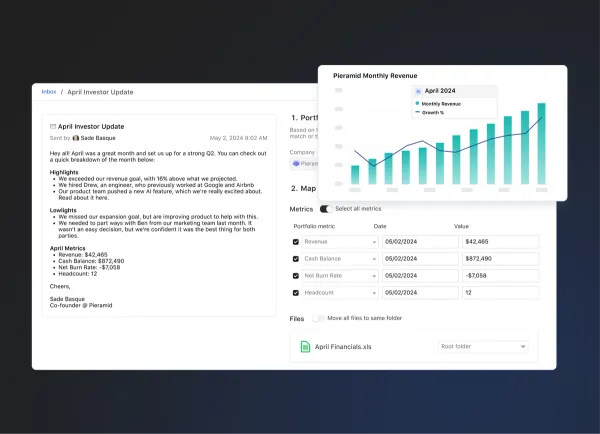
Raise capital, update investors and engage your team from a single platform. Try Visible free for 14 days.
Venture capital is relatively new. In the 80s and 90s venture capital was simply capital available to “tech” companies (e.g. silicon chips in the 90s). At the time, capital was enough of a differentiator for a VC fund to stand out. Since then, the market, and funding options available to startups, have exploded.
Y Combinator launched in the mid-2000s and began transforming the space. Since then name-brand VC funds have popped up throughout the country and the globe. Now, founders are looking for more from their investors (hiring help, future capital, leadership skills, technological help, etc.).
Related Resource: Seed Funding for Startups 101: A Complete Guide
One of the popular funding options and resources that has popped up over time is the incubator. As put by the team at Investopedia,
“An incubator firm is an organization engaged in the business of fostering early-stage companies through the different developmental phases until the companies have sufficient financial, human, and physical resources to function on their own.”
Learn more about incubators below:
What Do Incubators Do?
While different incubators will likely specialize in different aspects of business building, they generally help in all of the ways below:
Provides Feedback & Assistance With Business Basics
Incubators are generally suited to extremely early product ideas or businesses. One of the areas they are the best fit to help is by providing feedback and covering business basics. This might include things like establishing your business, brand, distribution strategy, and more.
Introductions to Other Startups & Networking Opportunities
Generally, incubators have cohorts or classes of startups. This means that they are seeing hundreds of startups throughout their lifecycle. Incubators are a great way to find introductions to other startups, founders, and partners they might have worked with in the past.
Includes Necessary Equipment – Including High-Speed Internet
Historically, incubators have a physical office space for startups to leverage. This is an opportunity for startups to save on office rent and leverage the equipment and tools they need to succeed — internet, conference rooms, desk space, etc.
Access to Investors
Once you’ve worked your way through an incubator, chances are you are ready to hit the ground running on your business. One of the common ways to do this is by scaling strategies you worked on during the incubator. To help with this, many incubators have demo days or a network of investors they will be able to introduce you to for a future round of financing.
Related Reading: All Encompassing Startup Fundraising Guide
Connections to Strategic Partners & Other Service Providers
Another benefit of an incubator is the partners and service providers that they work with. Oftentimes, incubators work closely with large organizations or have individuals present with their expertise. For example, an incubator might bring in someone that is an expert in product-led growth and can help you set up your process and make introductions to potential hires. On the flip side, they generally offer discounts to service providers to help you get things started.
Types of Business Incubators
Incubators tend to be a proving ground for different startup ideas and products. Due to this, different types of businesses and organizations have incentives to launch an incubator. Check out some of the most common types of incubators below:
Academic Institutions
One of the most common types of institutions that use incubators is academic institutions — generally large universities. This is a great way to allow current undergraduate and graduate students to pursue different ideas and businesses they might have in mind. Universities can tap into their network of experienced professors to help students with all aspects of business building. Additionally, universities also offer a massive network of alumni.
Non-Profit Organizations
Another business that leverages incubators is non-profit organizations. Non-profits are generally trying to solve large problems that impact people across the globe. Because of this, the space generally requires innovation and new ideas to help tackle these problems. Non-profits turn to incubators to help fuel innovation in the space and uncover the next entrepreneurs suited to help.
Related Reading: Impact Investors and Fund Managers to Know
For-Profit Corporations
Of course, for-profit corporations are very common in the incubator space. Corporations are likely looking for growth and innovation in their market and space. While they likely have teams dedicated to this in-house they also look outside their organization for areas where they can innovate and expand. Corporations will use incubators to search for new ideas and products from entrepreneurs that are in the space and can help their business grow even further.
Venture Capital Firms
Another common business that uses incubators is venture capital firms. VC firms are dedicated to investing in startups. Because of this, they are incentivized to help the earliest stage startups incubate their idea. This allows them to invest at a later date and get a head start on the diligence process. VC firms also have built out networks and partners that help their VC fund portfolio companies which translates well to helping the companies in their incubator.
Related Reading: The 12 Best VC Funds You Should Know About
What’s the Difference Between an Incubator and an Accelerator?
Incubators and accelerators have both become synonymous with the startup space. While you might think they are similar or the same, they do have a number of differences. An incubator is built to help the earliest stage ideas develop their business expertise and determine if they have a viable business.
Related Reading: Why Most Accelerators Fail…and Why Yours Doesn’t Have To
An accelerator is best suited to help businesses that are a step further. As put by the team at TechTarget, “A startup accelerator is a business program that supports early-stage, growth-driven companies through education, mentorship and financing. Startups typically enter accelerators for a fixed period of time and as part of a cohort of companies. While accelerator programs can provide beneficial resources to organizations at all stages of development, most focus on those that are pre-revenue.”
This means that these companies already have a business model and product in place and are ready to hit the ground running on their revenue growth and product development.
Is an Incubator Right for You?
Incubators aren’t for everyone. If you’ve got an understanding of your business model and product, you are likely ready to skip over the incubator and hit the ground running on your business. To learn how you can take your business to the next level, subscribe to the Visible Weekly – we search the web for the best tips to attract, engage and close investors, then deliver them to thousands of inboxes every week. Subscribe here.




